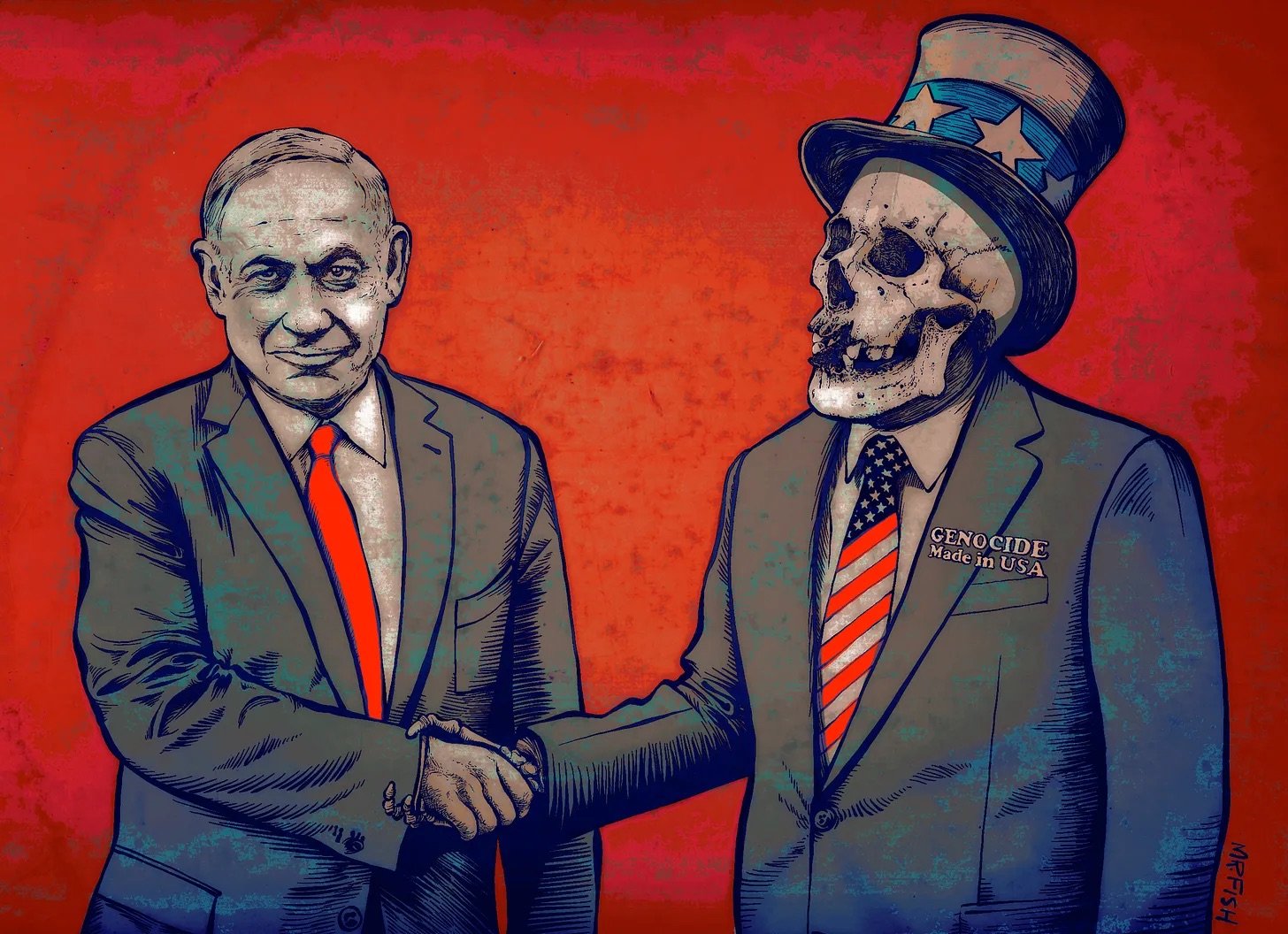Thou Shalt Not Commit Genocide



Flesh and Blood - by Mr. Fish
Opposing genocide is a moral, not a political choice.
by Chris Hedges
There is only one way to end the ongoing genocide in Gaza. It is not through bilateral negotiations. Israel has amply demonstrated, including with the assassination of the lead Hamas negotiator, Ismail Haniyeh, that it has no interest in a permanent ceasefire. The only way for Israel’s genocide of the Palestinians to be halted is for the U.S. to end all weapons shipments to Israel. And the only way this will take place is if enough Americans make clear they have no intention of supporting any presidential ticket or any political party that fuels this genocide.
The arguments against a boycott of the two ruling parties are familiar: It will ensure the election of Donald Trump. Kamala Harris has rhetorically shown more compassion than Joe Biden. There are not enough of us to have an impact. We can work within the Democratic Party. The Israel lobby, especially the American Israel Public Affairs Committee (AIPAC), which owns most members of Congress, is too powerful. Negotiations will eventually achieve a cessation of the slaughter.
In short, we are impotent and must surrender our agency to sustain a project of mass killing. We must accept as normal governance the shipment of hundreds of millions of dollars in military aid to an apartheid state, the use of vetoes at the U.N. Security Council to protect Israel and the active obstruction of international efforts to end mass murder. We have no choice.
Genocide, the internationally recognized crime of crimes, is not a policy issue. It cannot be equated with trade deals, infrastructure bills, charter schools or immigration. It is a moral issue. It is about the eradication of a people. Any surrender to genocide condemns us as a nation and as a species. It plunges the global society one step closer to barbarity. It eviscerates the rule of law and mocks every fundamental value we claim to honor. It is in a category by itself. And to not, with every fiber of our being, combat genocide is to be complicit in what Hannah Arendt defines as “radical evil,” the evil where human beings, as human beings, are rendered superfluous.
The plethora of Holocaust studies should have made this indelible point. But Holocaust studies were hijacked by Zionists. They insist that the Holocaust is unique, that it is somehow set apart from human nature and human history. Jews are deified as eternal victims of anti-Semitism. Nazis are endowed with a special kind of inhumanity. Israel, as the U.S. Holocaust Memorial Museum in Washington concludes, is the solution. The Holocaust was one of several genocides carried out in the 19th and 20th centuries. But historical context is ignored and with it our understanding of the dynamics of mass extermination.
The fundamental lesson of the Holocaust, which writers such as Primo Levi stress, is that we can all become willing executioners. It takes very little. We can all become complicit, if only through indifference and apathy, in evil.
“Monsters exist,” Levi, who survived Auschwitz, writes, “but they are too few in number to be truly dangerous. More dangerous are the common men, the functionaries ready to believe and to act without asking questions.”
To confront evil — even if there is no chance of success — keeps alive our humanity and dignity. It allows us, as Vaclav Havel writes in “The Power of the Powerless,” to live in truth, a truth the powerful do not want spoken and seek to suppress. It provides a guiding light to those who come after us. It tells the victims they are not alone. It is “humanity’s revolt against an enforced position” and an “attempt to regain control over one’s sense of responsibility.”
What does it say about us if we accept a world where we arm and fund a nation that kills and wounds hundreds of innocents a day?
What does it say about us if we support an orchestrated famine and the poisoning of the water supply where the polio virus has been detected, meaning tens of thousands will get sick and many will die?
What does it say about us if we permit for 10 months the bombing of refugee camps, hospitals, villages and cities to wipe out families and force survivors to camp out in the open or find shelter in crude tents?
What does it say about us when we accept the murder of 16,456 children, although this is surely an undercount?

